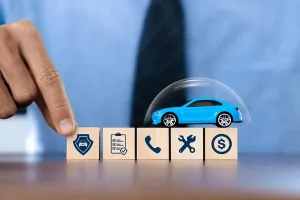Why You Shouldn’t Let Your Auto Policy Lapse…Even Temporarily

When your budget is tight, car insurance might seem like an expense you can put on the back burner, but an auto insurance lapse can trigger unexpected costs and serious legal consequences.
Maybe you’ve made all your payments on time but forgot to renew your policy before it expired—or you switched insurers but didn’t time the transition correctly, leaving you uninsured for a few days.
Short lapses in auto insurance coverage are common, but even a single day without insurance counts against you. Reinstating a canceled policy doesn’t erase the gap from your record.
That’s why it’s crucial to address an auto insurance lapse immediately by reinstating, renewing, or shopping for a new policy. Fortunately, the process is usually quick and straightforward, especially with the help of an experienced independent insurance agent. The agents at C&S Insurance can guide you through the challenges of a lapsed policy.
What Happens When You Miss a Car Insurance Payment
If you’ve missed an auto insurance payment for the first time, don’t panic; your policy won’t be canceled immediately. By law, your insurer must provide notice before canceling your policy. Depending on your state, this notice is typically sent by mail or email 10 to 20 days in advance.
Most insurance companies offer a grace period for missed payments, so a few days’ delay usually isn’t a problem. However, it’s best to make your payment as soon as possible.
Setting up autopay can also help. You can schedule automatic payments on a day that works best for you, and many insurers even offer discounts for using autopay.
What Happens When Your Car Insurance Lapses
Since auto liability insurance is required for drivers in every state except New Hampshire, letting your car insurance lapse can result in serious legal and financial consequences. Here’s what can happen if your coverage lapses.
Pay Out of Pocket for Accidents
If your policy lapses, you cannot file a claim if you cause an accident, injure someone, or damage a vehicle; yours or someone else’s. You’ll have to cover any medical, repair, or legal costs out of pocket.
Even if your policy is later reinstated, coverage cannot be backdated to protect you for accidents that occurred while uninsured.
Accidents without insurance can be financially devastating. The other driver may pursue legal action, potentially garnishing up to 25% of your disposable earnings or the amount exceeding 30 times the federal minimum wage.
Fines and License Suspension
When your insurance lapses, the DMV is notified that you are driving uninsured. Consequences may include license suspension, vehicle registration suspension, and fines ranging from $100 to over $1,500.
Courts may also require you to file an SR-22 for 3 to 5 years, a document proving you have insurance, which can increase your premium and include a filing fee.
Rate Increases
Even one day without coverage can cause your insurance rates to rise. Longer lapses result in higher increases:
- 1–30 days: 8–10% increase
- 31–60 days: 15–25% increase
- 60+ days: 30–50% increase
Skipping payments may feel like saving money, but starting a new policy after a lapse is usually more expensive than staying continuously insured.
Required Down Payments
After a lapse, insurers often require a substantial upfront payment when starting a new policy—sometimes 30–50% of a six-month premium.
Loss of Discounts
Continuous insurance coverage can qualify you for discounts as a reliable, safe driver. Even a single day without insurance can cost you these savings.
Limited Insurer Options
Many standard insurers avoid drivers with recent lapses, pushing them into the
Effect on Credit Score
If your policy was canceled due to missed payments and sent to collections, your credit score may suffer. This can impact your ability to take out loans, apply for credit cards, and secure housing.
Repossession Risk
Most lenders require comprehensive and collision coverage on financed or leased vehicles. If your insurance lapses, your vehicle could be repossessed.
Can You Let Your Policy Lapse if You No Longer Need Car Insurance?
There are situations when it’s okay to cancel your car insurance, but you should always contact your insurer or agent rather than skipping a payment.
- If you won’t be driving at all, insurance isn’t required—but returning to driving later may result in higher rates.
- Any lapse in the past 200 days pushes you into the non-standard insurance market, with higher premiums, larger down payments, fewer options, and stricter payment terms.
- If you’ve sold your vehicle but may drive occasionally, or plan to get another vehicle in the future, consider non-owner car insurance. This provides liability coverage at a lower cost while maintaining a continuous insurance history.
Military service may also allow you to maintain continuous coverage and avoid penalties. Speak with your insurer or agent to see if you qualify.
What to Do If You Have a Lapse in Your Auto Insurance Coverage
Here are steps to take if your car insurance has lapsed:
- Call your insurer. Confirm whether your coverage has lapsed and for how long.
- Ask about reinstatement. You may be able to pay the past-due balance to reactivate your policy.
- Consider a new policy. If reinstatement isn’t possible, speak to an agent about purchasing coverage immediately.
- Adjust coverage if necessary. Reducing coverage to the legally required minimum may save money, which is better than letting your policy lapse entirely.
If you’re concerned about a policy lapse or are dealing with one, your insurance agent can help you navigate these situations. Speak with an agent at C&S Insurance today to learn more.
